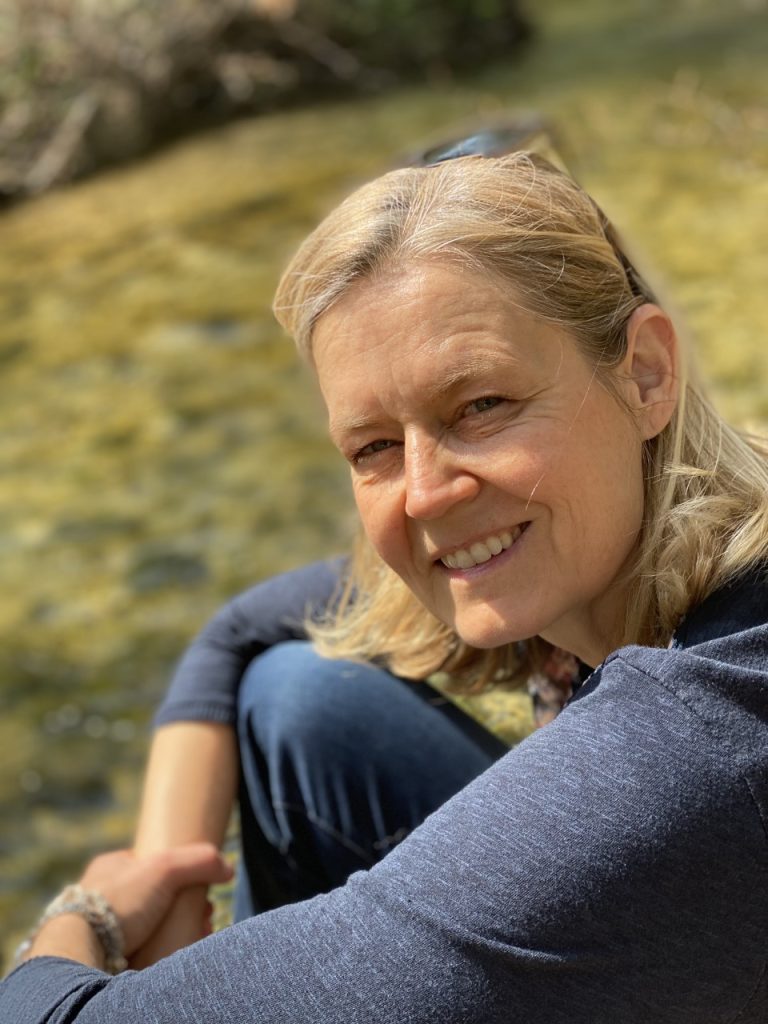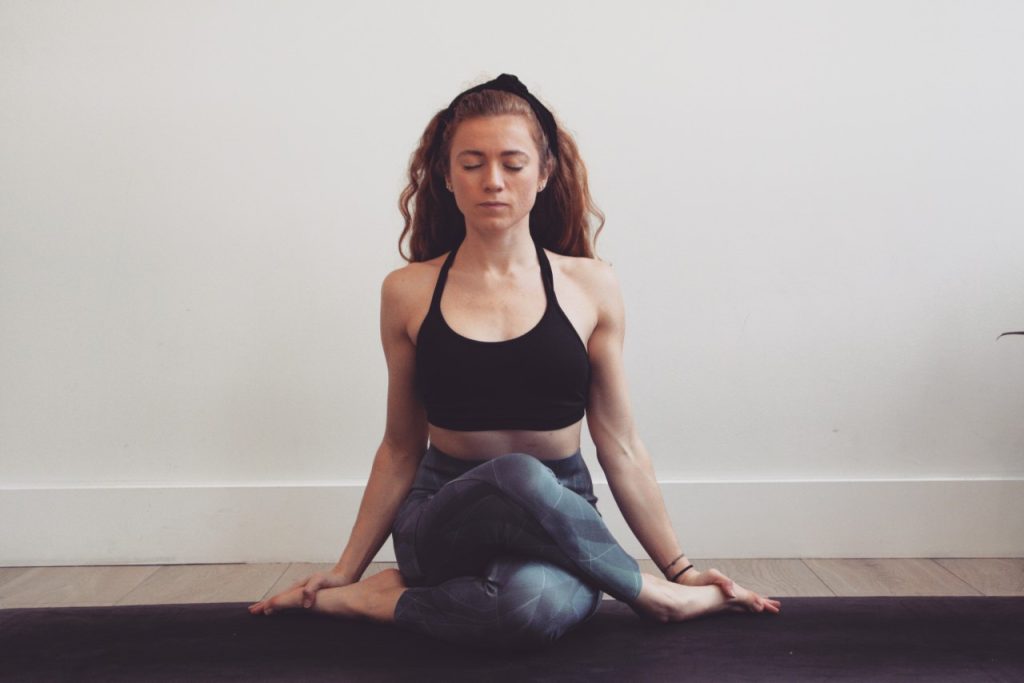Celebrating International Yoga Day
By UCL Faculty of Arts & Humanities, on 6 June 2022
We come from different departments (UCL Research, Innovation & Global Engagement, UCL South Asia Regional Network and the UCL Arts and Sciences) to celebrate International Yoga Day. This blog brings you perspectives of lived experience, living through yoga, and a scientific account of the positive effects of ‘pranayama’, or yogic breathwork. Our aim is to open evidence for how practicing yoga works, and encourage a deeper understanding, to stimulate wider practice.

Katherine Liddell (MASc Creative Health) and yogi
Katherine Liddell (MASc Creative Health student, yogi):
This is HAPPENING. Yoga is HAPPENING. Yoga is always in the background, offering constant, non-judgmental support. It’s been happening for several thousand years – first written about in the Upanishads and the Vedic texts that underpin sister traditions of Ayurveda and yogic philosophy. It is a free knowledge exchange: available for anyone who wants to partake, whenever they want to, starting from where they are. It doesn’t require knowledge, experience, or bendiness. It asks you to leave your ego at the door and sit on your mat and allow the experience of a practice to carry you away into internal exploration and focus during your stay. From 20 minutes to 3 hours, it’s what you can give, no more no less, no questions.
I have been practicing for decades but I still can’t stand on my hands away from the wall. Well, I can, for a limited amount of time, but the older I get the more fear of falling I have. Which is kind of a metaphor for my life too. But yoga has always supported me, since I found her (I will call yoga ‘her’ as, for me she typifies my existence of my feminine goddess form: outwardly I am seen to be one thing but internally, I have many qualities, unshared with the world, kept for me, but who make me the person I am). Yoga has made me strong, meditation and breathwork has partnered with her to bring a roundedness to my practice. For me, sometimes yoga invokes Kali, the goddess of death and transformation. She is fierce and strong, but compassionate and love also. Death is not the end, but a transformation, a reincarnation. Kali is the essence of Freedom and pushes boundaries, reminds me to calm my mind and focus.
The point for me to practice yoga is to calm the ‘chitta vritta’ – the monkey mind. By focusing on the breath during a yoga practice we are able to calm the chatter of the mind and be present, in the moment. Calm the mind, calm the breath. Calm the breath, calm the mind. In the Vedas, Patanjali defined yoga through the Sutras: if you can be in the moment, then you are in yoga.
We could consider the mind to be the chatter that constantly invades our thoughts. And our intellect is fact. What we know to be true, the rest, the chatter is just that: noise. If we aim to bring our breath to our consciousness whilst on the mat, we can calm the chatter and the intellect for just a moment. But a moment that will feed our wellbeing, our essence and return us to our spiritual self.
As with many things that have existed for centuries, many people want to OWN it, say it was they who first discovered x, y or z. Does it matter? If in the longer term, there is spill-over and others benefit exponentially? Western science would say they discovered certain health benefits from meditation and mindfulness as a modern phenomenon. Religions of all colours have practiced meditation and mindfulness for centuries: being self-aware, humble, accepting. Where we actively listen to others and try to be the best version of ourselves. Does it need to be ‘owned’ by some noun when historically, the knowledge has been shared freely. We don’t need to appropriate other cultures, but accept that Others can teach us, sometimes more than we already know, and honour and be grateful for that knowledge. In Western culture we have striven for evidence-based research: Ayurveda and yoga have known the intangible value of yoga, which is why it has lasted. It is written, evidenced, if you want to look. Passed down through the centuries. Perhaps it is a time when we can recognise the goodness that other cultures bring to the table.

Tori Bate (MASc Creative Health) and Yogi
Tori Bate (MASc Creative Health student, yogi):
‘Pranayama’ is an overarching name for multiple breathwork practices. ‘Ayurveda’ translates from Sanskrit to ‘the knowledge of health’ (1). Yoga disciplines have derived from ancient Vedic texts that aim to bring about physical, mental and emotional health. Here, yoga shall be used to encompass both asana (postural) and pranayama (breathwork). We examine the impact and efficacy of pranayama practices.
One study found Bhastrika Pranayama (translated as ‘breathing practice’) had a 1.3% increase in VO2Max (Maximum Oxygen Consumption) over a six-week Bhastrika Pranayama intervention where p= 0.05 (1). Plotting pre-post low-frequency heartrate variability, a tendency toward a normalisation state in both naive and experienced cohorts yoga practitioners (2). Normalisation implies yoga asana and pranayama can promote homeostasis of the cardiovascular system.
Pranayama-based studies (3)(4) have shown statistically significant decreases within cardiovascular measures, with greater improvement seen within slow-pranayama exercises. Research highlights yoga’s therapeutic qualities and low expense with recommendations to introduce pranayama as a blood-pressure management technique within the medical profession. A yoga-lifestyle based intervention saw a reduction in blood glucose in both sexes whilst lipid profiles significantly improved only within females (5). Fast pranayama significantly improves cognitive performance over slower technique. An increase across all Audio and Visual Reaction Times (ART) were seen with statistical significance within ART and VRT-Red where p<0.05, and VRT-Green at p<0.01 (6). Studying the practice of chanting. Ramamoorthy et al. (2020) evaluated the effect of Sudharshan Kriya Pranayama (Ujjayi, Bhastrika and chanting). Results showed favourable oral and gut health with 1/3 improvement in microbiome (7). One study illustrated experienced practitioners had preferential levels of anxiety, fatigue and tension with HRV also showing significantly higher autonomic variability, vagal tone and ability to recover from mental arithmetic stress (8). One study showed those engaged in mindful walking were 53.1% less Depressed than the control group when using the BDI (9). Blood sample analysis demonstrated an increase in neuroplasticity and psychosomatic communication biomarkers post 12 weeks, CI=95% (10).
As my friend says, if you don’t bring something to the table, what’s the point? No matter how small or insignificant, bringing yourself to the mat is committing to a better you, a better version of yourself, a calmer, stronger, healthier, person. How wonderful.
References
1. Bal BS, Kaur P, Singh D, Bhardwaj M. Effects of 6-weeks Bhastrika Pranayama Intervention on health-related components of physical fitness. Physical Education of Students. 2021;25(4):230-8.
2. Shinba T, Inoue T, Matsui T, Kimura KK, Itokawa M, Arai M. Changes in Heart Rate Variability after Yoga are Dependent on Heart Rate Variability at Baseline and during Yoga: A Study Showing Autonomic Normalization Effect in Yoga-Naïve and Experienced Subjects. Int J Yoga. 2020;13(2):160-7.
3. Sharma VK, Trakroo M, Subramaniam V, Rajajeyakumar M, Bhavanani AB, Sahai A. Effect of fast and slow pranayama on perceived stress and cardiovascular parameters in young health-care students. Int J Yoga. 2013;6(2):104-10.
4. Bhavanani AB, Sanjay Z, Madanmohan. Immediate effect of sukha pranayama on cardiovascular variables in patients of hypertension. Int J Yoga Therap. 2011(21):73-6.
5. Yadav RK, Magan D, Yadav R, Sarvottam K, Netam R. High-density lipoprotein cholesterol increases following a short-term yoga-based lifestyle intervention: a non-pharmacological modulation. Acta Cardiol. 2014;69(5):543-9.
6. Sharma VK, M R, S V, Subramanian SK, Bhavanani AB, Madanmohan, et al. Effect of fast and slow pranayama practice on cognitive functions in healthy volunteers. J Clin Diagn Res. 2014;8(1):10-3.
7. Ramamoorthy A, Mahendra J, Mahendra L, Govindaraj J, Samu S. Effect of Sudharshan Kriya Pranayama on Salivary Expression of Human Beta Defensin-2, Peroxisome Proliferator Activated Receptor Gamma, and Nuclear Factor-Kappa B in Chronic Periodontitis. Cureus. 2020;12(2):e6905.
8. Tyagi A, Cohen M, Reece J, Telles S, Jones L. Heart Rate Variability, Flow, Mood and Mental Stress During Yoga Practices in Yoga Practitioners, Non-yoga Practitioners and People with Metabolic Syndrome. Appl Psychophysiol Biofeedback. 2016;41(4):381-93.
9. Schuver KJ, Lewis BA. Mindfulness-based yoga intervention for women with depression. Complement Ther Med. 2016;26:85-91.
10. Bisht S, Chawla B, Tolahunase M, Mishra R, Dada R. Impact of yoga -based lifestyle intervention on psychological stress and quality of life in the parents of children with retinoblastoma. Ann Neurosci. 2019;26(2):66-74.
 Close
Close


 Vega: I’m a first-year undergraduate studying Arts and Sciences with a major in Societies and a minor in Health and Environment. Having grown up in a French-English bilingual environment in Geneva, Switzerland, going to the French Institute’s Night of Ideas, felt, in some ways, like coming home. In our piece, we decided to reflect on the way that lessons from the past can aid us in the attempt (that was the subject of wide-ranging discussions throughout the evening) to ‘build back together’.
Vega: I’m a first-year undergraduate studying Arts and Sciences with a major in Societies and a minor in Health and Environment. Having grown up in a French-English bilingual environment in Geneva, Switzerland, going to the French Institute’s Night of Ideas, felt, in some ways, like coming home. In our piece, we decided to reflect on the way that lessons from the past can aid us in the attempt (that was the subject of wide-ranging discussions throughout the evening) to ‘build back together’. Sara: I’m also a first-year undergraduate student at UCL studying Arts and Sciences and majoring in Societies. As a Lebanese, the idea of the importance of memory felt very close to my country and its current situation. A crisis of remembrance and commemoration has definitely played a big role in the crisis which Lebanon finds itself drowned in. The Night of Ideas was very enlightening as it made us think of our roots and pushed us to focus the piece on the importance of remembering our past and finding a balance to rebuild a better future together.
Sara: I’m also a first-year undergraduate student at UCL studying Arts and Sciences and majoring in Societies. As a Lebanese, the idea of the importance of memory felt very close to my country and its current situation. A crisis of remembrance and commemoration has definitely played a big role in the crisis which Lebanon finds itself drowned in. The Night of Ideas was very enlightening as it made us think of our roots and pushed us to focus the piece on the importance of remembering our past and finding a balance to rebuild a better future together.
